Social Media for Kids: Parents Opinions on Social Media Platforms Making Versions for Children

YouTube Kids Rated the Safest Social Media Platform, According to Over 1,000 Parents [Survey]
In the past decade, social media has been prolific, entering almost every aspect of our lives. While many (if not all) of these platforms have age requirements for users, there’s been talk about expanding to platforms specific to children. While some may rejoice at this idea, others have raised some viable concerns. In order to gauge parental sentiment toward this idea, we asked over 1,000 parents of children 17 and under to share their feelings with us.
Key Takeaways
- Nearly half of parents surveyed allowed their children to create a social media account before the age of 13.
- 52% of parents hadn’t talked to their children about cyberbullying.
- 1 in 5 parents caught their child posting on a “finsta” (fake Instagram account).
- 63% of parents were concerned their child may get hurt trying to replicate the next big viral TikTok trend.
When it comes to social media at large, parental feelings are quite clear: it should come with age and use restrictions in order to keep kids safe from the dangers that may lurk within.
You Must Be This Old to Scroll
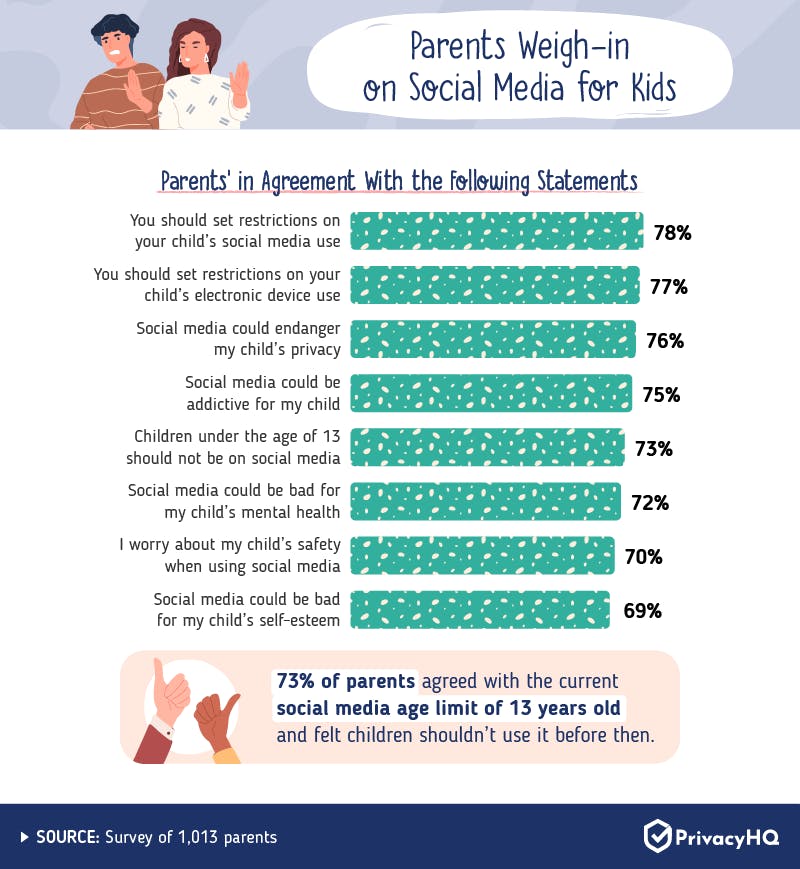
While 71% of parents agreed that the development of Instagram for Kids should continue, they also expressed their concerns with social media overall. Seventy-eight percent of parents believed restrictions should be set on children’s social media use, and 69% worried social media could be detrimental to their child’s self-esteem. In this case, it’s possible parents believed in setting those restrictions in order to protect their children. These worries are not unfounded, as researchers continue to study the effects of social media on the mental health of children and teenagers.
Parental Control
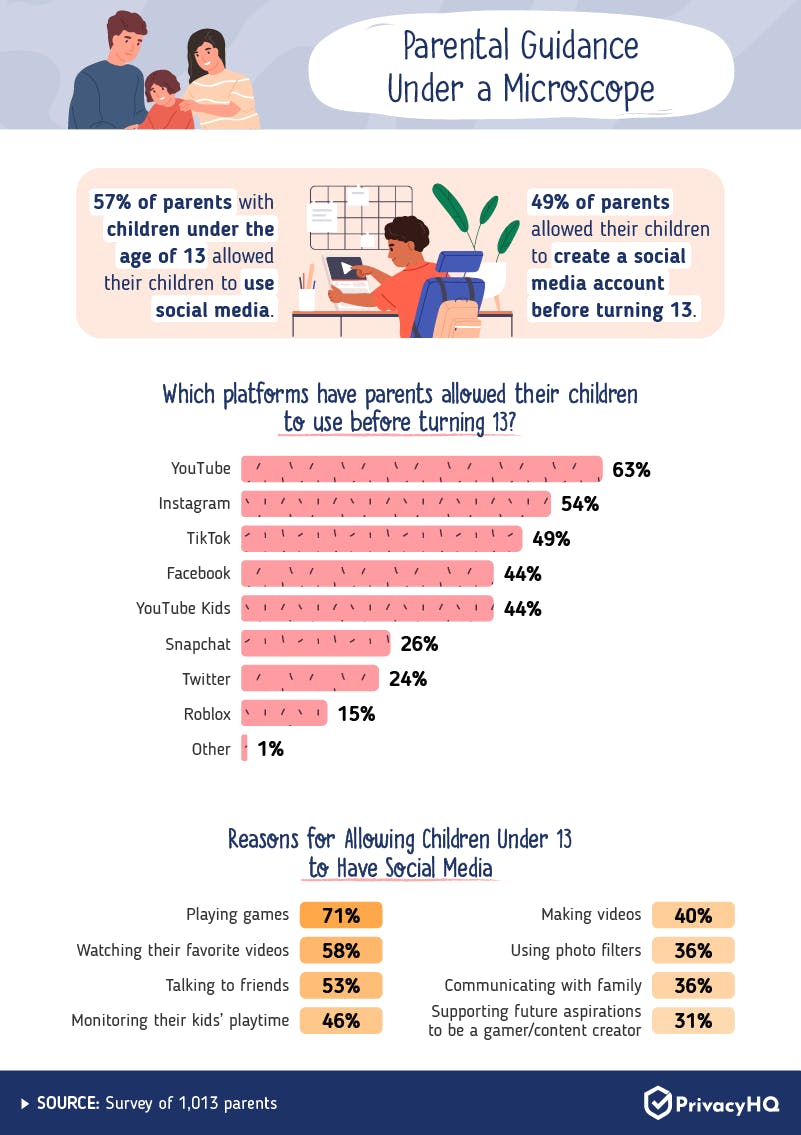
Even though social media platforms have age restrictions in place to help prevent children from accessing them, almost half of parents admitted to allowing their children to create a social media account before the age of 13. YouTube, Instagram, and TikTok were the top platforms for this. These are three of the most popular social media platformsworldwide. In the age of the influencer, it should come as no surprise that 40% of parents allowed their children under the age of 13 to create social accounts to make videos, and 31% did so for the sole purpose of their child wanting to be a gamer or content creator in the future. With children as young as age 9 raking in views and ad revenue for something as simple as opening toys, it makes sense that parents and children might want to explore this route. While more and more children and teenagers are seeking this path, it’s important they learn how to safely navigate these spaces online.
The Tech Talk
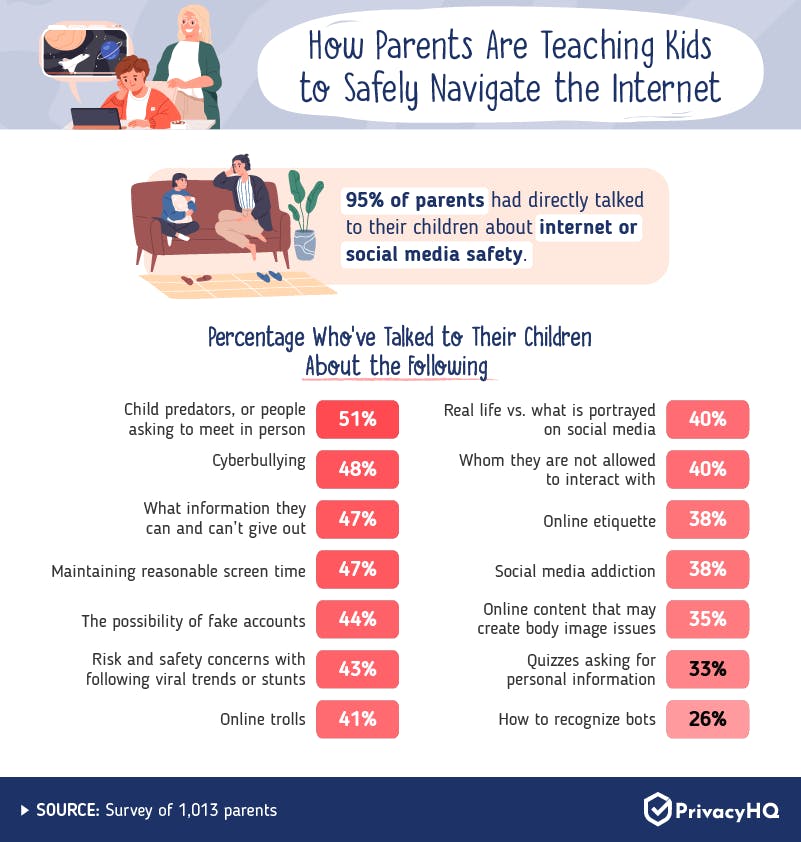
While parents may be giving their children early access to social media platforms, they are not doing so carelessly. Ninety-five percent of parents said they’ve discussed internet and social media safety with their children. With the popularity of social media influencers and viral videos, it’s comforting to know that parents are discussing safety concerns (43%) and side effects social media can cause, such as social media addictiveness (38%) and body image issues (35%). However, there’s only so much you can prepare children for in the online realm, and in the end, it’s up to them to follow parental guidance.
Bad Habits
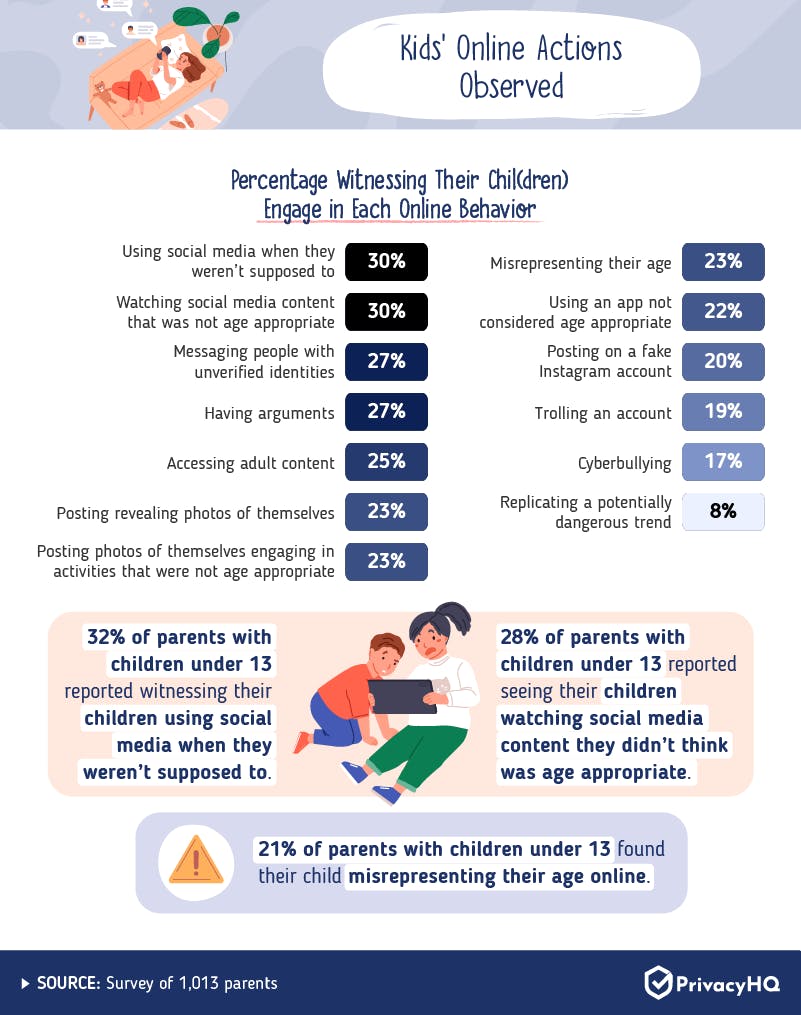
By now, it seems we should all expect kids to be at least a little rebellious, and there’s no exception when it comes to their social media habits. With 30% of parents catching their children using social media when they weren’t supposed to, and 20% of their kids posting to fake Instagram accounts, or “finstas,” teenage rebellion has taken to the online sphere. Even though 1 in 10 parents say they’re not concerned about their children’s social media safety yet, over 1 in 4 had witnessed their kids messaging people with unverified identities. It’s understandable for kids and teens to want a taste of the untapped freedom and chaos social media and the internet at large can provide, but within that freedom lay those very dangers parents have tried to warn their children about. In the end, who’s responsible for protecting them on these platforms: parents or the social media companies themselves?
The Blame Game
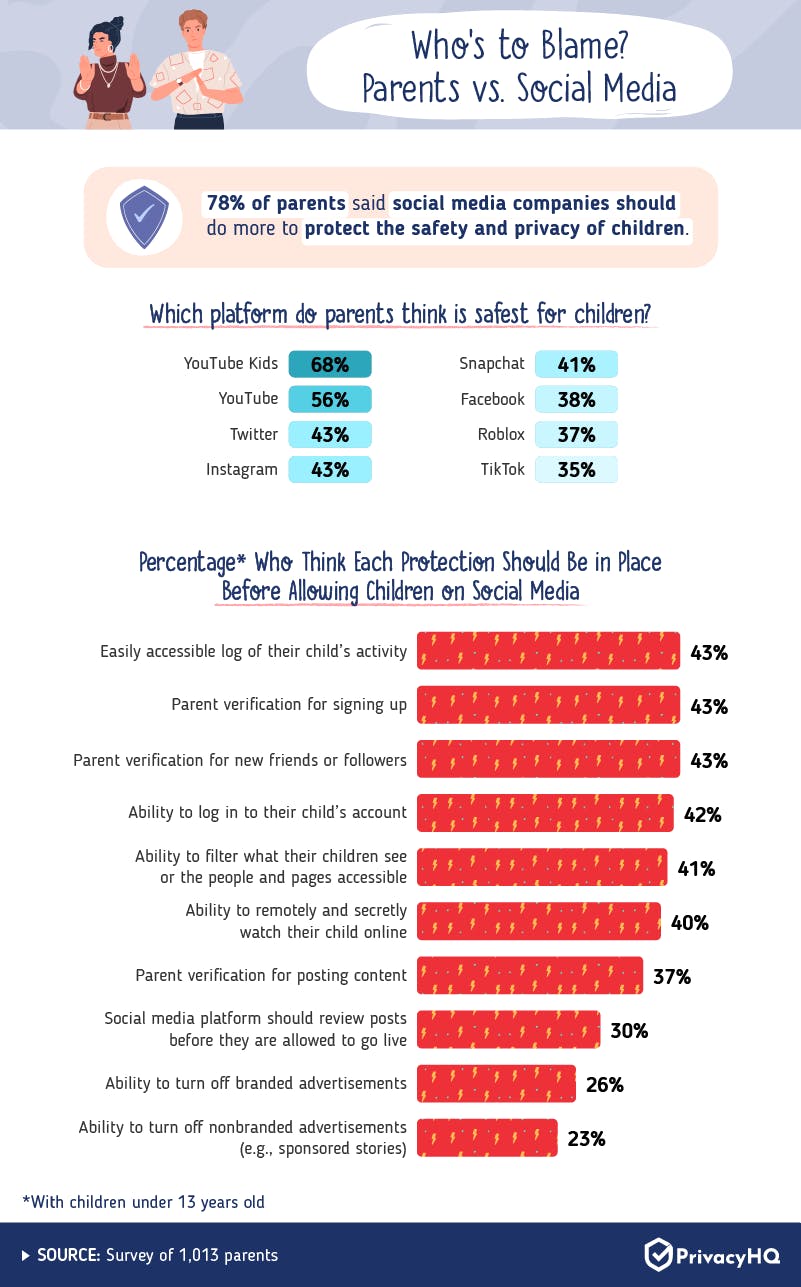
With kids willing to ignore the advice of their parents and engage in risky behaviors online, it makes sense that 78% of parents think social media companies should do more to protect the safety and privacy of children. YouTube Kids and YouTube were rated as the top perceived safest platforms for children. YouTube Kids may fall in the top spot due to its “contained environment” for children to explore, YouTube proper may claim the No. 2 spot due to the availability of a restricted mode and its set of parental controls. While kids may want that aforementioned freedom online, 43% of parents of kids under 13 said they’d want the platform to give them the ability to access their child’s activity logs on social media before they’d allow them to create an account. A further 43% said they’d prefer parent verification for both their child signing up as well as for new friends or followers for their child. With so many kids and teens wanting to follow in the footsteps of their favorite influencers, it might feel increasingly difficult for parents to keep their kids safe online.
A Bad Influence?
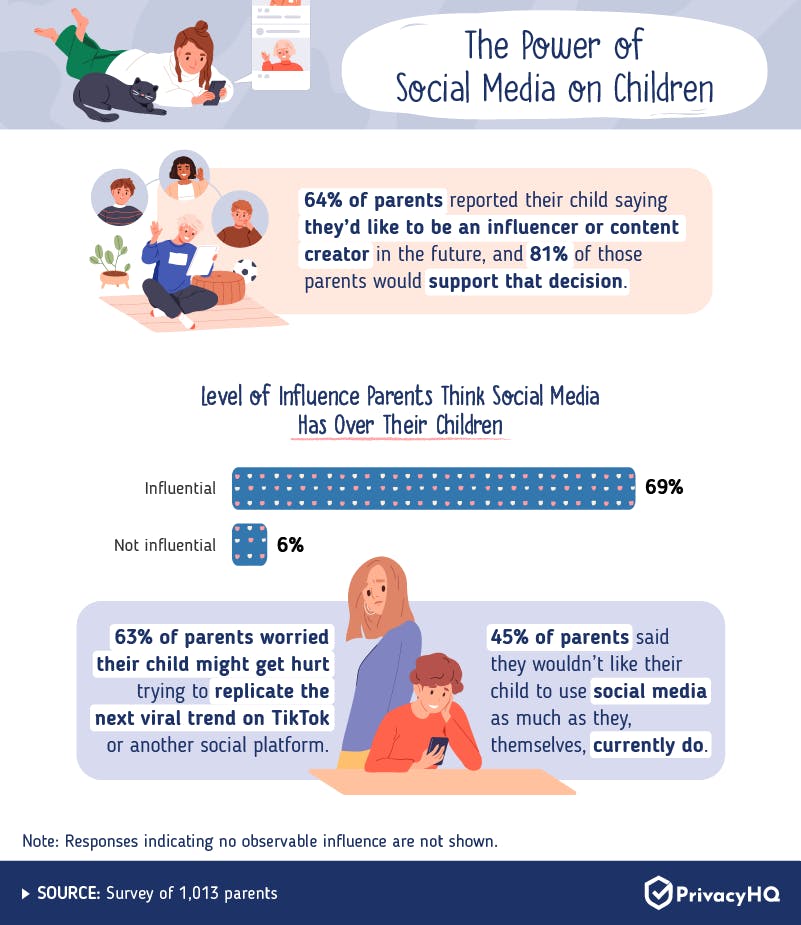
On average, Americans spent over 1,300 hours in 2020 consuming social media content. Spending this much time on these platforms has exposed viewers to a variety of trends and influencers, so much so that 81% of parents said they’d support their children if they decided to become influencers or content creators in the future. While it’s natural for parents to want to be supportive of their children, almost half of parents also stated that they don’t want their children
using social media as much as they do themselves. For those who seek to avoid the “do as I say, not as I do” style of parenting, consider limiting your own time on social media to set a good example for your children.
Of Parenting and Platforms
While many parents are rightly cautious of letting their children run amuck online unsupervised, kids and teens will always find new ways to circumvent safety measures (even when it’s against their best interests). And while many parents want to support their children’s ambitions of becoming an influencer or other online personality, these endeavors are not without risk to their personal security (both online and off).
Until kid-specific social media platforms are officially rolled out and widely in use, the best thing parents can do is keep themselves and their children informed of dangers online, be it the latest dangerous viral trend or news of a data breach. To learn more about privacy news and personal security online, visit PrivacyHQ.
Methodology and Limitations
For this project, we surveyed 1,013 parents with children up to 17 years old. 659 of those parents had children under the age of 13. Parents’ ages ranged from 21 to 69 years old and were comprised of 49% who identify as men, 50% as women, and less than 1% as nonbinary. Respondents were asked a series of questions via Amazon’s Mechanical MTurk platform.
Issues with self-reported surveys include, but are not limited to, telescoping, selective memory, and lying. To reduce the number of false answers, attention-check questions were asked, and those failing these questions were disqualified from the survey and their answers were excluded.
Fair Use Statement
In the ever-changing landscape of social media, it pays to stay up to date on the trends and what might be coming next. If you’d like to share this information (be it with a parent, child, or someone else) feel free; just make sure it’s for noncommercial purposes and that you link back to this page.